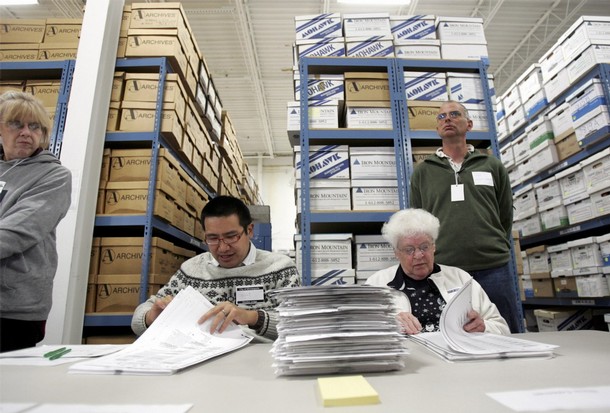Recount Blues
The numbers behind recounts.

In case anyone was wondering what the likelihood is that recounts will matter in the ongoing saga of 2020, let’s ask Karl Rove (via the WSJ: This Election Result Won’t Be Overturned) about the history:
Mr. Trump is now pursuing legal challenges in Pennsylvania, Wisconsin, Michigan, Arizona and Nevada, and there will be an automatic recount in Georgia, given Mr. Biden’s 0.29-point lead there. Senate Majority Leader Mitch McConnell is correct that Mr. Trump is “100% within his rights” to go to court over concerns about fraud and transparency. But the president’s efforts are unlikely to move a single state from Mr. Biden’s column, and certainly they’re not enough to change the final outcome.
There are only three statewide contests in the past half-century in which recounts changed the outcome: the 1974 New Hampshire Senate race, the 2004 Washington governor’s contest, and the 2008 Minnesota Senate election. The candidates in these races were separated, respectively, by 355, 261 and 215 votes after Election Day.
These margins aren’t much like today’s. Mr. Biden led Wednesday in Wisconsin by 20,540 votes, Pennsylvania by 49,064, Michigan by 146,123, Arizona by 12,614, Nevada by 36,870 and Georgia by 14,108.
Add to that Harry Enten at CNN: Joe Biden’s win grows more decisive each day as votes are counted
the chance of a recount overturning the results in 2020 is basically nothing. Fairvote has looked at statewide recounts since 2000. The average shift in votes has been a mere 430 votes and 0.02 points. The largest shift in votes was a little less than 2,600 and 0.11 points.
All of Biden’s advantages are considerably larger than that right now. In other words, Trump would need multiple recounts to see movement in votes than simply hasn’t happened in the last 20 years.
Perhaps, although I will not hold my breath, any recounts will help ease the doubts of some voters. But they aren’t going to change the outcome.




I have long speculated that the Trump (administration and advisor’s) strategy is to string the election out as long as possible using legal challenges and recounts in an attempt to force various state legislators to select their own slate of electors.
An added feature of prolonging the “ascertainment of the succeeding presidency” is to hamstring the efforts to have a smooth transition. (Petulance to the max) .
On a different track is the SoS of Georgia. A manual hand recount of all presidential ballots is going to take much longer than be subject to (in my opinion) greater error than would a machine recount/rescan of all ballots on high speed machines – approximately 10,000 per hour).
The GOP hopes do not hinge on a recount; they hinge on disqualification of broad swathes of (legal) votes cast. They know they lose if all of the votes are counted correctly; the goal is (still) to make sure that large tranches of votes get tossed out.
@Bob@Youngstown: My understanding is that the GA recount simply hand separates the Biden v. Trump ballots, since those are the only two categories (no down ballot recount). Then the two groups are counted by machine.
The 2004 WA Governor election was way more complicated, it was only on the 2nd recount (so 3rd count) that the Dem (Gregoire) barely took the lead (over R – Rossi). Ballot boxes were “found” in poll workers’ cars a few days after the election in the Seattle area (King County). Alzheimer’s facilities (Snohomish County) had 100% voter participation. What it showed was systemic voter fraud (nothing organized, just a bad system) in WA and over the next few years in WA the voter rolls removed all the dead voters and such, better audits instituted and so on. Trump is grasping at straws, but the voting process can (and should be) improved.
With the move to increasingly automated voting systems, the chance of a recount changing the vote totals by more than a handful of votes isn’t likely. There is a small possibility that a processing error could have been made that wouldn’t be repeated, but not mis-counted votes.
At the time of Durkin-Wyman, NH not only used paper ballots, but rather than today’s optical scanner where you color in the circle, there was a box next to each candidates name where the voter was to make an X or check mark to indicate preference. Additionally the ballot allowed for a ‘straight party vote’ preference and it wasn’t unusual for a voter to chose to vote for one party or the other, then make down ballot selections that contradicted the initial choice.
Anyway after several recounts and determinations regarding disputed ballots, the election was a flat-foot tie with 4 ballots that no one could discern the voters intention. The Senate then ordered a new election.
reload didn’t work this time
@Richard Gardner: And even in 2015 when my mom passed away, I needed to write the King County Election board to request my mom be removed from the voting records. I can’t remember whether the escrow attorney reminded me of it or whether it was because she had been called for jury duty, but removal still doesn’t just happen automatically or anything.